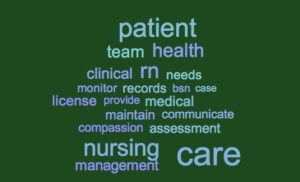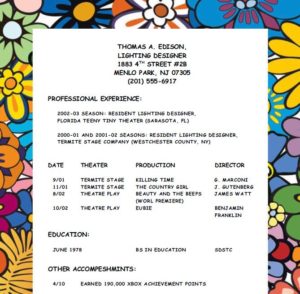An impressive nurse resume is essential in getting your first job after graduation. Creating a resume for the first time can be a challenge since it’s tricky to determine the most important information employers want to see in a nurse’s resume.
Here are practical and effective tips on how you can create an exceptional nurse resume that will get you results.
Do’s in Resume Writing
1. Use one font style and size throughout your resume.
Employers prefer to see uniformity in the layout of an applicant’s resume. Times New Roman with a font size of 12 is recommended as it is the golden standard of font format for applications. See a comprehensive list of recommended fonts HERE.

2. Summarize your qualifications at the beginning of your resume.
This is your “profile” which presents a summary of who you are professionally. In making a summary of your qualifications, make it short and straight to the point. Avoid exaggerations and make the descriptions realistic.
3. Use relevant keywords.
This is very important if you are submitting your nursing application online since employers are keeping applicants’ resumes in a database. When they are searching potential nurses for interview, the search function of this database looks for specific keywords entered in the search inquiry.
If you want your resume to be search engine-friendly, use relevant keywords. In bigger institutions that employ automated systems, many nurse resumes are already “cut” due to the absence of important keywords. When choosing keywords, consider the position you are applying for and the requirements in their job posting.

4. Organize information in chronological order, starting with the most recent one.
Employers look for the most recent experience when evaluating work history. They like to evaluate resumes with chronologically arranged information so they can quickly scan through the resume.
The most relevant information in a resume is usually the most recent one so always arrange the details of your resume in chronological order.

5. Include your clinical experiences as a nursing student.
If you don’t have any prior work experience to list, it is best to include details about your clinical rotations. Include only those relevant to the position you are applying for.
However, if you already have prior entry-level experience, you should skip including your clinical experience as a nursing student.
Also Read: 12 Things You’ll Never Learn in Nursing School.
6. Use formal action verbs in describing your skills, responsibilities, strengths and accomplishments.
Use “prepared” instead of “responsible for” and “developed” instead of “helped”. Use of formal and strong action verbs emphasizes the details of your resume.
Other action verbs recommended in highlighting the details of your accomplishments include:
– Create
– Collaborate
– Coordinate
– Delegate
– Direct
– Encourage
– Formulate
– Manage
– Plan
– Serve
7. Be consistent with your writing style throughout the resume.
If you used a third-person point of view at the beginning, maintain it till the end. If you used an action verb for each beginning of a bulleted list, make sure to start every bulleted item with action verbs as well.
Your employers will glean personality traits from your resume so make sure to keep your nurse resume professional, organized, methodical, and consistent.

8. Be honest with your experience.
Some newly graduated nurses make the mistake of exaggerating or faking their nursing experiences just to make their resume appear impressive. Don’t do this and be honest with your listed professional experience.
When shortlisted, employers make the extra effort of verifying listed professional experiences and you will be quickly dropped off the list once they verified the details of your professional experience.
Also Read: 20 Tips for Nurses in Their First Year of Nursing
9. Have someone read your resume to double-check for errors.
No matter how you repetitively proofread your resume, it is still best to have a second pair of eyes go through your document. You can miss a simple typographical error or a grammatical flaw even if you have read it several times already.
With so many good quality resumes to go through, hiring departments are quick to discard resumes with typographical errors or grammatical flaws.

10. Make descriptions and other details short and concise.
Make everything straight to the point. Employers like to scan for resumes with concise and well-organized information as they are easy and quick to read.
Avoid lengthy but empty sentences and don’t worry about a description being too short as long as you included all your ideas with it. Hiring departments can spot fillers a mile away.
Also Read: How to Make a Perfect Nursing Resume: 8 Tips for Nurses
Don’ts in Resume Writing
1. Avoid use of italics, underlines, lines, shadings, graphics, and additional font formats.
This will make your resume less scannable in resume databases. Emphasize important headings in bold.

2. Don’t write “References available upon request”.
It is understood that employers will request for character references if they are interested in checking your professional background. Just make sure to include your contact details so they can quickly contact you when they needed one.
3. If you can’t keep to a one-page resume, make sure it’s not longer than two pages.
A one-page resume is best but if you can’t squeeze all your professional information into one, it’s acceptable to have a two-page resume. Resumes beyond two pages are often disregarded by employers.
4. Don’t include details about your hobbies and other non-health related activities.
These details will make your resume look unprofessional. Include only those relevant to nursing.

5. Don’t list personal information like height, weight, marital status and race.
Employers don’t need to know about these details. It is also illegal for them to ask about these information as it signifies discrimination.
6. Don’t include experiences irrelevant to nursing.
Entry-level nurses make the mistake of listing all their experiences in their resumes just to boost the details of their professional experience. Nursing managers don’t need to know the other work experiences you had before pursuing a nursing career. Include only those experiences related to nursing.
You may also include uncompensated nursing experiences since you are listing them as “Professional Experience” and not as “Work Experience”.
7. Don’t get too creative with your resume.
Don’t print your document in fancy colored papers or add decorative borders. For font colors, stick to black. Getting creative with your resume format will make it look less professional to nursing managers.
8. Avoid a chatty tone in the flow of your sentences.
Maintain a professional tone throughout the resume. Don’t make the descriptions sound like you are talking personally. You can use first-person point of view but limit descriptions to a professional way of writing.
9. Do not use fancy serif fonts.
Employers prefer to see Times New Roman, Arial or Helvetica in a nurse resume. Standard font size may run between sizes 11 to 12. Using other font style may make your resume look less professional.
10. Don’t list club memberships.
To make their resumes looked like they are packed with lots of professional strengths, newly graduated nurses often list club memberships. Don’t include any club memberships unless they are relevant to the position you are applying for. They are unnecessary information employers don’t need in selecting potential nurses for hiring.
Here’s a sample of a resume for an entry-level nursing position:
Sample Resume
John Smith, RN
Contact Information
Profile: Responsible and highly motivated registered nurse with dedication and expertise in pediatric nursing.
Qualifications: Embraces the challenges of patient care. Collaborates with interdisciplinary healthcare team to deliver high quality nursing care to patients. Experiences includes six-month intensive training in PICU and 56 hours of clinical rotation in pediatric wards. Trained in improving patient satisfaction, pediatric basic life support, team building and charge nursing.
Education
American University of Health Sciences, Signal Hill CA, May 2015
Bachelor of Science in Nursing, with Honors
Professional Experience
October 2014 – April 2015: Children’s Hospital Los Angeles
PICU Nurse Trainee
– Provided well-child care including immunizations, anticipatory guidance, and health promotion education to a primarily underserved African American community.
– Managed acute illnesses and chronic disease exacerbations for infants, children, and adolescents.
– Collaborated with nursing assistants in providing bedside care.
– Participated in unit meetings and on-site skill demonstrations.
– Documented the nursing care rendered to handled patients.
March 2014 – October 2014: Children’s Hospital of Orange County
Student Nurse Trainee
– Provided care to assigned patients under the supervision of a clinical instructor.
– Participated in direct bedside care.
– Completed documentation of accomplished nursing care rendered.
Other Activities
Member, American Pediatric Surgical Nurses Association 2015 – 2016
Student Member, Society of Pediatric Nurses 2014 – 2015
Now try your hand at creating your own nurse resume. Use the above tips as a checklist and you definitely won’t be steered wrong.





















